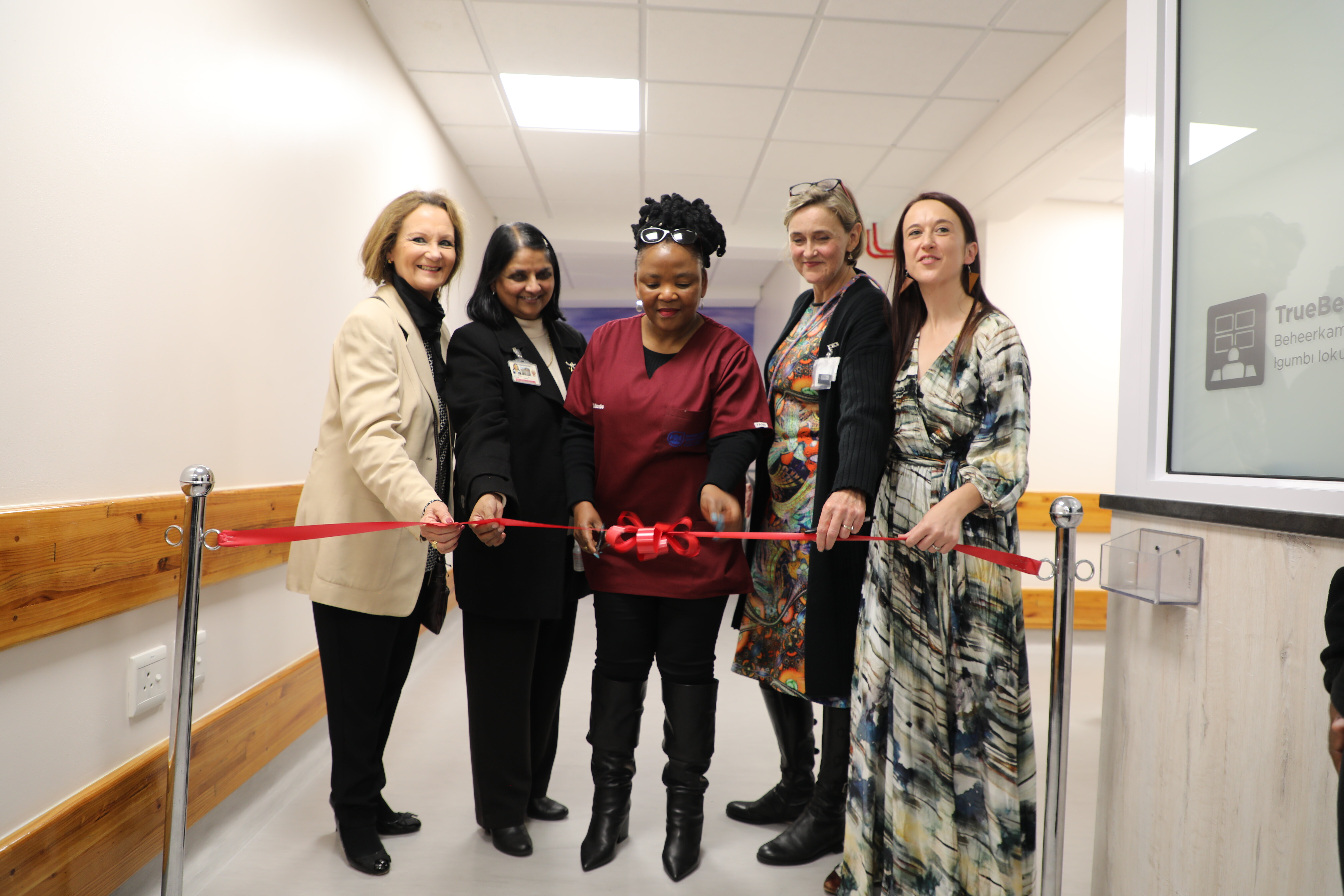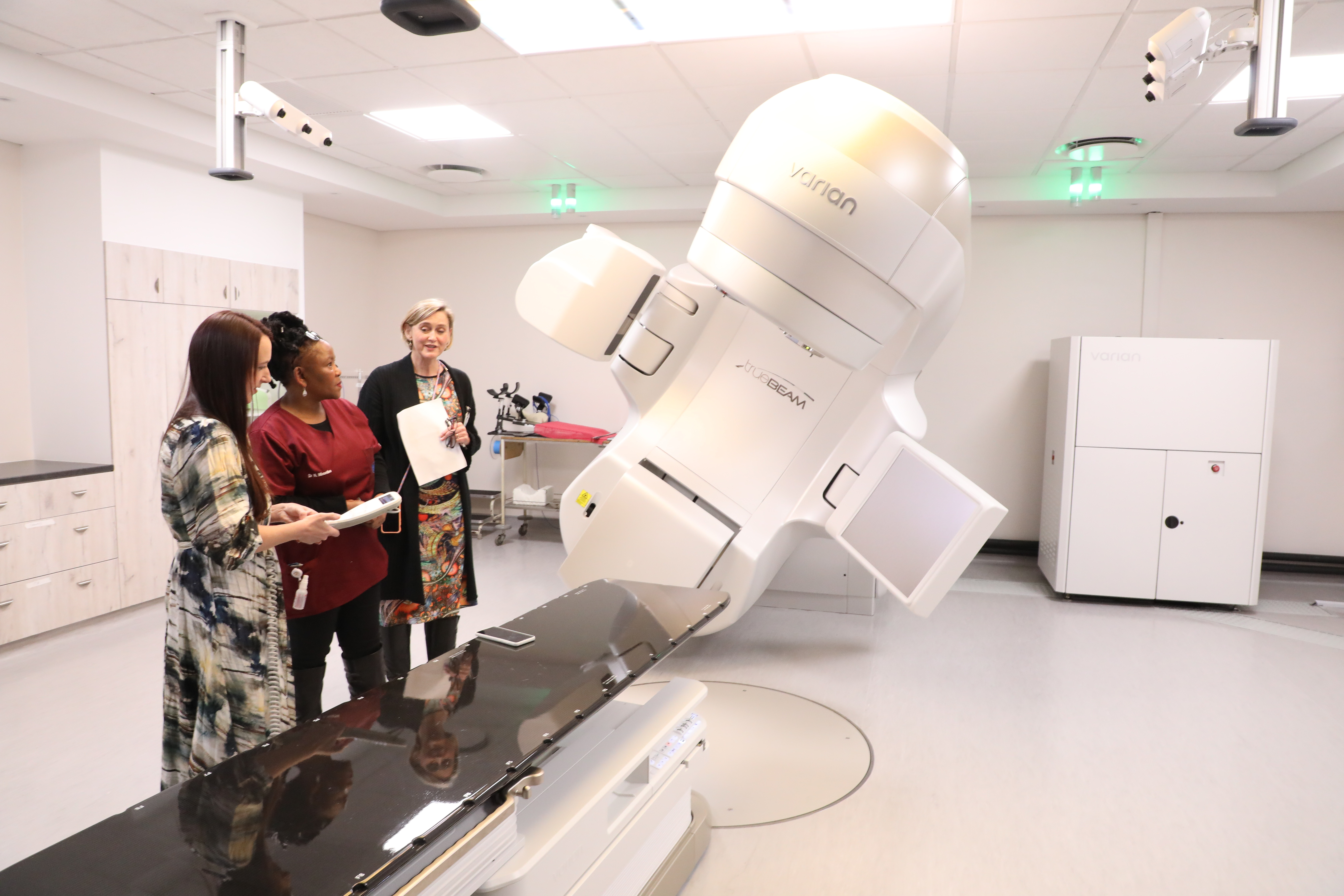
News
Advancing radiotherapy treatment for cancer patients at Groote Schuur Hospital
To improve radiation therapy treatment for cancer patients, Groote Schuur Hospital yesterday (26 June) unveiled the first of two new linear accelerator (LINAC) machines in the Western Cape. Both Groote Schuur and Tygerberg Hospitals will soon be equipped with these new machines at R47 million each, which use high-energy particles or waves, to destroy or damage cancer cells, emitted from a device called a linear accelerator. Most treatments will be done in short outpatient visits of 30 minutes to one hour, requiring no hospitalisation.
The Department of Radiology Oncology at Groote Schuur Hospital treats approximately 3 000 new patients every year and half of them require radiotherapy. This LINAC machine will allow sophisticated radiosurgery to take place and will lessen the probability of side effects. In addition, it provides different advanced treatment options for breast and lung patients.
An excited Professor Jeannette Parkes, Head of Department Radiology Oncology, explained: “We are excited to unveil this state-of-the-art machine, which will allow advanced radiotherapy techniques such as volumetric modulated arc therapy, radiosurgery, and stereotactic body radiotherapy. This means that many patients with brain lesions who previously were treated with surgery, or not treated, can now be treated. It also will allow treatment of lesions elsewhere in the body, allowing better local control of paraspinal tumours, and certain types of tumours in the spine, liver and lungs. It also has electrons, so superficial treatments can be done. This feature is not available on our other machines. It is also the only LINAC at the hospital with high energy, which means we can treat large breast patients with ease. With its flattening filter free (FFF) beams, very high dose rates are possible, which means very fast patient treatment, less time for patients on the treatment bed, increased patient comfort and higher patient throughput. It can treat the complete range of patients, from very basic palliative therapy to very advanced, specific, and accurate stereotactic therapy.”
According to Dr Bhavna Patel, CEO of Groote Schuur Hospital, the hospital, supported by the Western Cape Government, prides itself in offering the best possible care to patients. “This newly acquired equipment will assist in the treatment regimens of our cancer patients. The burden of treatment is steadily increasing. Our team of specialists include clinicians, radiographers, physicists, nurses, therapists, and other ancillary staff who are commended for the wonderful service that they provide alongside these high-tech pieces of equipment. This team continues to deliver service excellence of a high standard.”
Dr Nomafrench Mbombo, Western Cape Minister of Health and Wellness, said these additions are yet another example of her department prioritising investment in infrastructure. “Our facilities are our vehicles for service delivery where we provide life-saving care to residents, especially in terms of oncological care. Cancer remains a prevalent disease which affects many people's lives in the Western Cape. The unveiling of the new medical linear accelerator as well as the additions of the brachytherapy theatre, orthovoltage treatment and new CT-simulator – will greatly capacitate the province to continue to offer modern healthcare services for the treatment of cancer. I look forward to the positive impact these investments will have on our patients going forward at both tertiary healthcare facilities.”
On the day, other new equipment and treatments including the CT – simulator, orthovoltage treatment and brachytherapy were also unveiled.
Brachytherapy – A first of its kind in Africa
Brachytherapy is a radiotherapy technique where a small radioactive source is used to treat cancer. The radiation is focused on the tumour, with a lesser dose to the surrounding healthy organs. Currently at Groote Schuur Hospital, after-loader brachytherapy is mostly used to treat gynaecological cancers.
Brachytherapy has been done at Groote Schuur Hospital since the 1960s. In March 2018, the hospital installed the Bravos brachytherapy after-loader, the first of its kind in Africa, and a modern treatment planning system.
In September 2022, the brachytherapy suite was moved into the core Radiotherapy Department in L Block and underwent a major renovation with the main advantages bringing about a more patient-centred approach, with a much better experience for patients, and more efficient use of staff and resources.
With the Bravos in the same building as the Radiotherapy CT-simulator, patients now have access to modern 3D planning for brachytherapy.
There is also the potential to expand brachytherapy services to treat oesophagus, bronchus, and prostate cancers, in addition to external beam radiotherapy.
Orthovoltage treatment – Only one of its kind in Western Cape
In addition to four linear accelerators (LINACs) and brachytherapy, the Radiotherapy department installed an orthovoltage treatment unit in March this year. Orthovoltage radiotherapy uses low energy radiation to treat cancer and other conditions that occur either on or close to the skin surface, for example melanoma, squamous cell carcinoma (SCC) and basal cell carcinoma (BCC) as well as non-malignant skin conditions such as keloids.
The shallow penetrating energy of orthovoltage beams means that they are often superior to megavoltage external beams generated by a LINAC when treating superficial lesions.
CT – simulator – first in South Africa
The Radiotherapy department also recently installed a wide-bore CT-simulator, in addition to the existing Toshiba wide-bore scanner which was installed in 2014 – making this 128-slice Siemens Somatom Go Open Pro the first in South Africa, which enables the medical team to scan the patient in the treatment position, with added immobilisation equipment, which aids positioning and therefore treats patients accurately. A total of 128 slices makes this CT scanner fast, which becomes very important for techniques like breath-hold scans for breast Radiotherapy, a technique we will incorporate now with this CT and treatment on the new Truebeam LINAC. Furthermore, the machine has an artefact-reduction algorithm, which provides clearer images to make radiotherapy more accurate.





